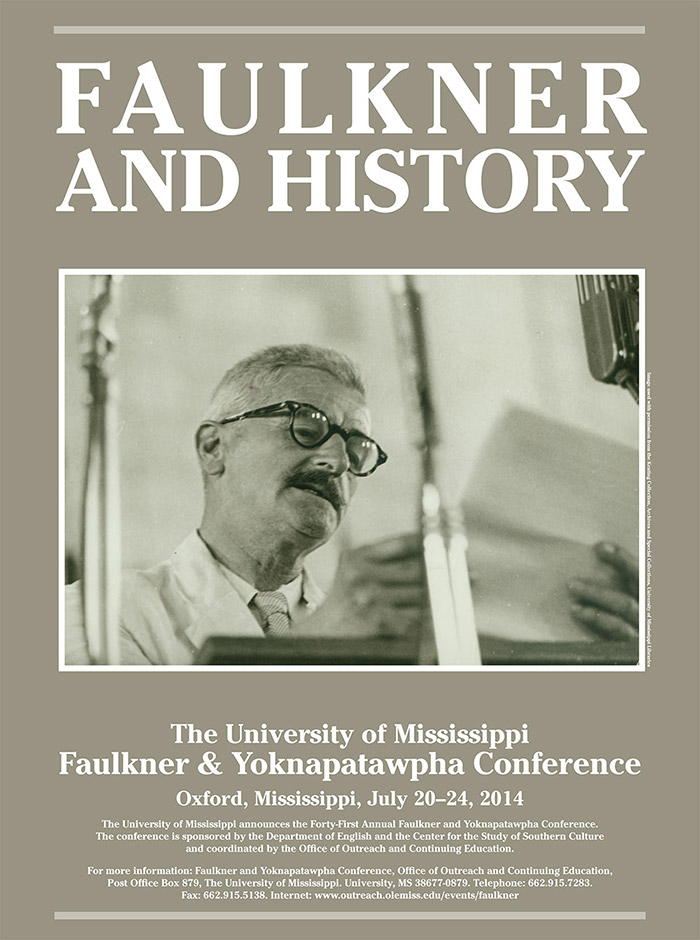
Panel. Local and Regional Histories
Location
Nutt Auditorium
Start Date
23-7-2014 8:00 AM
Description
- The University in Faulkner / Peter Froehlich, Pennsylvania State University at Hazleton
- Topologies of Discourse in Absalom, Absalom! / Charles Hannon, Washington and Jefferson Colleges
This presentation uses network theory and information modeling to reveal storytelling networks in two novels by William Faulkner: Flags in the Dust and Absalom, Absalom!. The network that emerges in Absalom, Absalom! is more distributed, more robust, less centrally controlled, than the one in Flags. While this difference can be explained as the result of Faulkner’s modernist experimentation with novelistic form, I historicize Absalom’s narrative innovation as the result of a specific political debate in Faulkner’s hometown of Oxford, MS, over whether to give up local control over the generation of electricity and join the Tennessee Valley Authority (TVA) electrical network. I argue that the more distributed network of storytellers in Absalom! (compared to that of Flags) is a representation of the debate over local vs. distributed power generation in Oxford, MS, in 1935-36. - A Biopolitical Understanding of History and Crisis Management in The Wild Palms / Elizabeth Steeby, University of New Orleans
Faulkner’s bifurcated novel The Wild Palms (whose very title to this day resists singularity, with contemporary covers including both the commercial title and Faulkner’s original title, If I Forget Thee, Jerusalem) hinges on paradoxical dualities—criminal/savior, father/abortionist, freedom/punishment—and invites a complication of how we read historically-based subjects, events and contexts in fiction. Taken together, I analyze how these twined narratives suggest a new era of biopower, ushered in by crisis, and bent on regulating unruly bodies in the name of life, health, and protection. While the phenomena of floods and babies are seemingly timeless, I argue that Faulkner’s quite modern subjects are at the whim of emergent biomedical systems being folded into Jim Crow’s ever-adapting carceral landscape
Relational Format
Conference proceeding
Recommended Citation
Froehlich, Peter; Hannon, Charles; and Steeby, Elizabeth, "Panel. Local and Regional Histories" (2014). Faulkner and Yoknapatawpha Conference. 20.
https://egrove.olemiss.edu/fy/2014/schedule/20
COinS
Jul 23rd, 8:00 AM
Panel. Local and Regional Histories
Nutt Auditorium
- The University in Faulkner / Peter Froehlich, Pennsylvania State University at Hazleton
- Topologies of Discourse in Absalom, Absalom! / Charles Hannon, Washington and Jefferson Colleges
This presentation uses network theory and information modeling to reveal storytelling networks in two novels by William Faulkner: Flags in the Dust and Absalom, Absalom!. The network that emerges in Absalom, Absalom! is more distributed, more robust, less centrally controlled, than the one in Flags. While this difference can be explained as the result of Faulkner’s modernist experimentation with novelistic form, I historicize Absalom’s narrative innovation as the result of a specific political debate in Faulkner’s hometown of Oxford, MS, over whether to give up local control over the generation of electricity and join the Tennessee Valley Authority (TVA) electrical network. I argue that the more distributed network of storytellers in Absalom! (compared to that of Flags) is a representation of the debate over local vs. distributed power generation in Oxford, MS, in 1935-36. - A Biopolitical Understanding of History and Crisis Management in The Wild Palms / Elizabeth Steeby, University of New Orleans
Faulkner’s bifurcated novel The Wild Palms (whose very title to this day resists singularity, with contemporary covers including both the commercial title and Faulkner’s original title, If I Forget Thee, Jerusalem) hinges on paradoxical dualities—criminal/savior, father/abortionist, freedom/punishment—and invites a complication of how we read historically-based subjects, events and contexts in fiction. Taken together, I analyze how these twined narratives suggest a new era of biopower, ushered in by crisis, and bent on regulating unruly bodies in the name of life, health, and protection. While the phenomena of floods and babies are seemingly timeless, I argue that Faulkner’s quite modern subjects are at the whim of emergent biomedical systems being folded into Jim Crow’s ever-adapting carceral landscape

